01 January 2023 / 6-Min Read / Translate
The theme for the article is "X before Y". Where I suggest that X is more important than Y. But like all these sorts of posts, it's not always true and might not be true for you, so read them with an open mind.
I don't generally recommend setting squash goals in January purely because we are in the middle of our season and while you should regularly reassess your goals, I believe that squash golas should be set in the summer.
Anyway, Happy New Year and I hope you find the article interesting. Don't forget to email me your complaints!

Original photo by Petteri Repo
I can't argue that fitness is not important in squash - it is, but I can argue that if I had a choice between being the most skilful player in the world or being the fittest player in the world, I wouldn't hesitate in selecting skilful. And for many club players being even a little fitter could make a big difference, but only in the short term. Fitness comes and goes, but skill lasts a life time.
Skill can compensate for a lack of fitness, and maybe fitness can compensate for a lack of skill, but without the ability to hit the ball well, your fitness is useless.
Working on your fitness is psychologically fulfilling, who doesn't love the feeling of a hard workout? Well, I suppose a lot of people, but fitness work feels like you really are improving your squash, whereas hitting the ball, often alone, for hours just doesn't have the same feeling. Skill is also much harder measure and quantify than fitness.
Let me finish this maxim by saying after having lots of breaks from squash over the years, I have always found it easy to get back to my previous skill level than fitness level. It's quite possible that for the rest of your squash life you can increase your skill level, the same definitely can't be said for your fitness!
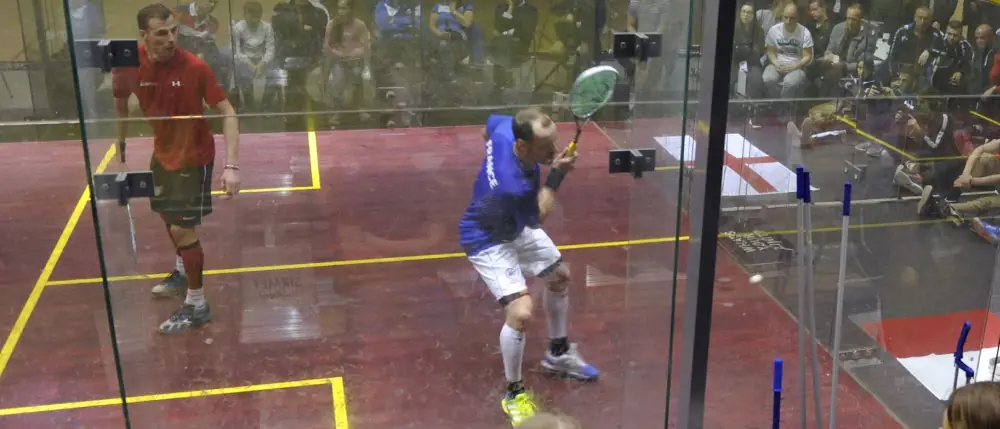
Original photo by Petteri Repo
I know lots of people who can hit the ball hard, I know fewer people who can hit the ball tight, and I know a handful of people who can hit the ball hard AND tight. With modern rackets, power hitting is easier to come by than it ever has been. In the past, you had to have great technique to hit the ball hard, but not nowadays. Modern rackets give even beginners the chance to smack the ball.
But as the saying goes, "with great power comes great responsibility" and clearly the person was talking about squash when they said those famous words. Well, probably not directly about squash, but they do apply to squash! Okay, seriously though, being able to hit the ball hard and with control is the aim, but simply being able to hit the ball without much control is not going to win you matches. You need to be able to learn what's the hardest you can hit the ball WITH control. That should then be your average speed. In my experience that's about 80% your maximum power.
I always advise varying the speed you hit the ball, even if it is just a little (see the video below), but having a known controllable max speed is very useful. Some will argue that they have won matches purely because they could hit the ball hard, and I won't try to deny that it does work sometimes, but the better you get, the less that works.
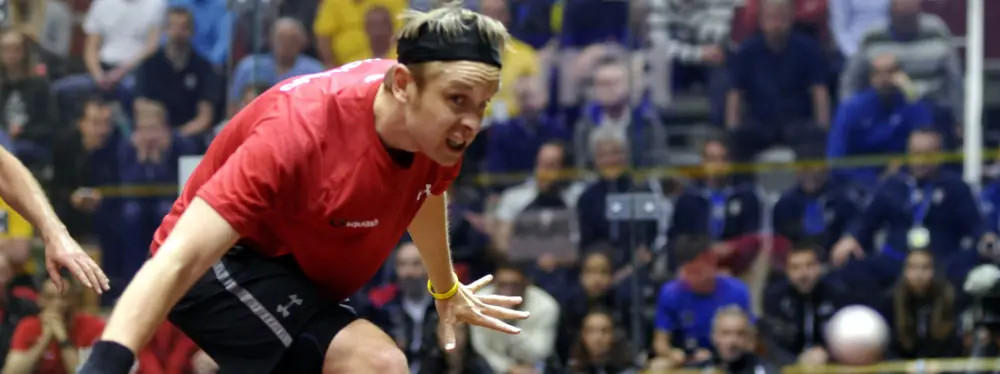
Original photo by Petteri Repo
The foundation of great squash is getting your opponent off the T and out of position. Ideally that means into the back corner as they then have less space to swing and because you are in front of them. Too many club players play attacking shots when they are not in the best position. They do this because they lack patience and fitness, plus a lack of critical decision making skill/experience.
It's easy for me to sit in the comfort of my sofa and complain about club players' decisions in the heat of a close match, but those decisions are often the diference beween winning and losing. as obvious as it may seem to you now, you need to hit the ball deep first before you think about going short. Sorry, but you are not Willstrop or El Shorbagy. It's highly unlikely you will be able to play drops from the back of the court and be succesful.
To some degree, great squash is obvious squash. Some players can add flair and excitement to squash, but they do that AFTER they have built up the ability to do the basic very, very well. Please, get good at putting your opponent in the back of the court before you try to dazzle them with shots to the front.
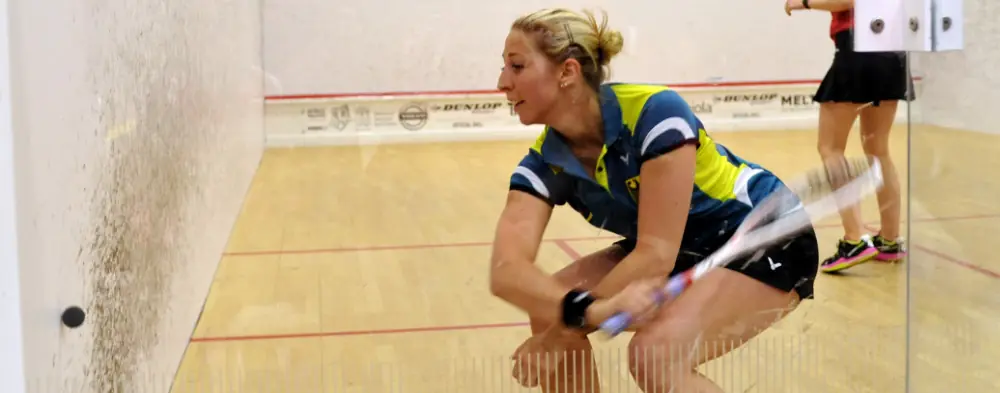
Original photo by Petteri Repo
A well-hit wide crosscourt is a great shot. But in some ways it has to be more accurate that a straight shot. If a crosscourt is slightly too wide or just not wide enough you opponent can take the ball early and rush you. A very tight drive, even if it is short or too deep, will cause your opponents problems due to its tightness.
The side walls can be your friend or enemy; their your friend if you use them well and your enemy if you fear them. In professional squash rallies, there is a mini psychological battle going on that is about "who can hit the ball tighter". The same can happen at club level and it's fun to play, but you must have the right approach. If you fear those tight shots then your opponent hs won that battle. If you relish the chance to hit the ball back from a very tight shot, then they haven't won the battle yet.
A tight straight drive of any length will limit your opponents' options. It will boost your confidence and make your crosscourt more effective. That's why you need to hit more straight drives than crosscourt, at least at the beginning of a match or each game. "But Phillip, my drives hit the side wall and land in the middle"! Then it's time for some coaching or solo drills. Think back to Maxim 1 and 2: Skill Before Fitness and Control Before Power!
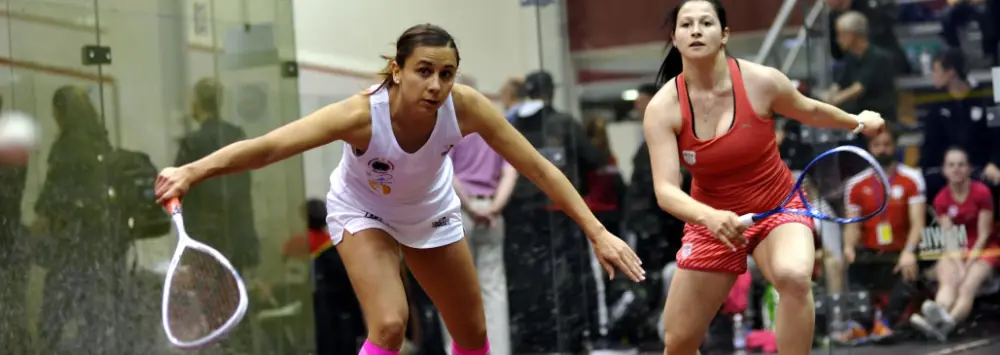
Original photo by Petteri Repo
some players and coaches will disagree with this maxim more than others. Being able to disguise your shot is a very useful skill, but only if the resultant shot is good enough - that's how I see it. So I promote the idea of being able to hit a great but obvious drop shot before worrying about disguising it.
When you watch professional squash players play, they have a lot of disguise in their shots, so it's natural to want that in your game too. But ask yourself which is better: An obvious but great shot or a disguise but terrible shot? Perhaps you believe the second and in some cases you would be correct, but again, the better you get and the better your opponent, the less that will be true.
Imagine playing any player in the top ten in the world, make or female. Now imagine that they agree to shout out the shot they are going to hit well before they hit it. Do you honestly believe it would make much difference to you? I don't.
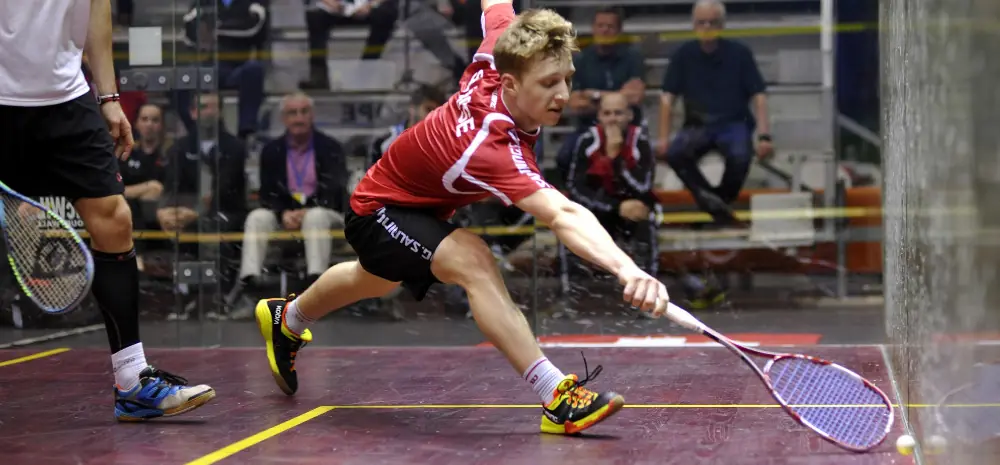
Original photo by Petteri Repo
We all want to be succesful. Of course what success is to each person is a different question, but on the squash court success probably means winning and if it doesn't, which is fine, then it probably means playing well. But either way, you won't be successful without hard work. Yes, you can get lucky and win points etc, but long term success comes from hard work. There's no other way. No player, in any sport, got to world number one from just being lucky. No player ever reached their potential without hard work.
Today of all days (1st Jan) is when people set goals, but honestly I would prefer you just set the very vague goal of working hard every day on your squash. Even if it is just 20 minutes: DO SOMETHING EVERY SINGLE DAY TO IMPROVE YOUR SQUASH!
there is plenty of good advice on the interent about sensible goal setting, and I advise you to avoid setting goals in January anyway. Just remember, if you want to become a better squash player you have to put the time in. No new racket or "Secret Squash Tip" will have a long-term effect without hard work.
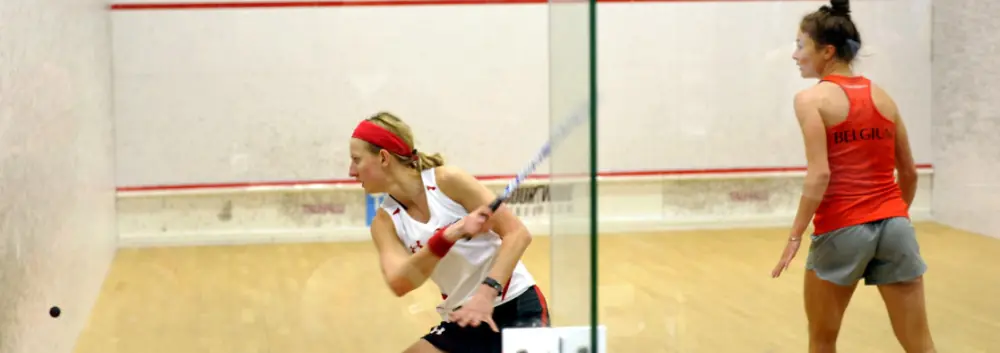
Original photo by Petteri Repo
I've written about a "Bad Gameplan Is Better Than No Gameplan" and I stick by that concept. Walking onto the court and not having even a simple plan is a bad idea. You can't make a decision about where to hit the ball every single shot. You need some plan. Now, let me be very clear, of course you "can" decide what to hit just before every single shot, but knowing what is. good shot from that position and what is a risky shot is very helpful. My point is that you need to get your opponent off the T and into the corners, and that is in itself a plan.
In the same way I believe that you need good shots before disguise, I feel you need some basic plan before you can start to improvise. If you are improvising all the time, your opponent will "expect the unexpected" and you won't be able to surprise them.
A game plan doesn't have to be complicated and in some ways the best game plans are kept as simple as possible. It's sometimes more about giving you something to concentrate on rather than some super insightful tactical advantage.
The above seven maxims are nothing more than guides. They aren't true all the time, but they should help as a starting point. Players will always be able to point to situations where one or more of the maxims were not the best option. But that doesn't mean they aren't useful. Think of these maxims as tools in your work bag. One is a hammer, the other a screwdriver, the other a pair of pliers. If you only have a hammer, then every problem is a nail. If you have different tools, then your answer to a problem can be more specific.
Feel free to email me your thoughts on my maxims, even if you disagree with them. All I ask is that you consider them and try them on court. Good Luck and let's hope we all have a great Squash 2023!